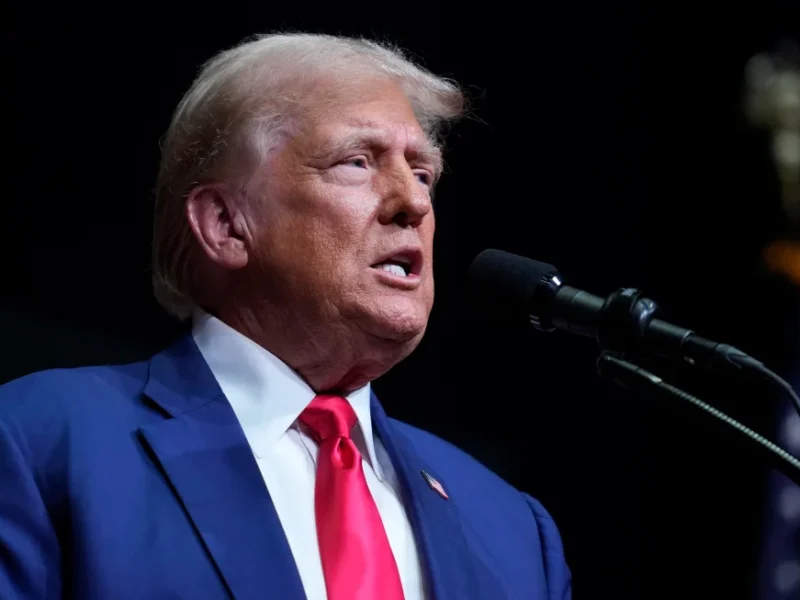When former President Donald Trump reposted a fake image of Taylor Swift mimicking the iconic Uncle Sam recruiting poster, it brought the issue of unauthorized digital replicas to the forefront.
With concerns over the rise of AI tools, lawmakers at state and federal levels have been advocating for regulations to protect individuals from the misuse of their name, voice, image, and likeness. Experts see Trump’s post as a prime example of why these legislative efforts are necessary, especially as it becomes one of the most high-profile false claims in the 2024 campaign.
Over the weekend, Trump reposted several images on his Truth Social platform, including one showing Swift as Uncle Sam with the text, “Taylor wants you to vote for Donald Trump.” In response to the fake endorsement, Trump commented, “I accept!” Swift has not endorsed any candidate in this race, and her representative did not respond to CNN’s request for comment.
In a Wednesday interview with Fox Business, Trump denied creating the images, saying, “I don’t know anything about them, other than somebody else generated them, I didn’t generate them. These were all made up by other people. AI is always very dangerous in that way.”
The ELVIS Act has been introduced.
Tennessee recently passed the Ensuring Likeness Voice and Image Security Act, or ELVIS Act, to safeguard against unauthorized use of content that replicates a person’s image or voice. This new law, effective last month, extends the state’s right-of-publicity legislation to cover all media forms, aiming to protect artists specifically.
This act might offer a legal route for individuals like Taylor Swift, who has ties to Nashville, to pursue action. According to Tennessee Senate Majority Leader Jack Johnson, the law addresses the challenges posed by AI advancements on artists and their work.
Joseph Fishman, a Vanderbilt University law professor specializing in intellectual property, notes that the law’s broad scope covers nearly any unauthorized use of a person’s likeness or voice, provided the distributor knew it was unauthorized.
Since 2019, various states have introduced laws targeting fake content, with at least 40 states considering such legislation in 2024, as reported by the National Conference of State Legislatures. While these laws aren’t exclusively focused on AI-generated content, many aim to address explicit material or deceptive political content.
Additionally, over a dozen states have enacted laws to regulate deepfakes—realistic but fake content created using AI—often imposing severe penalties for violations, including imprisonment and fines.
Numerous regulations exist, but no federal law.
Despite an increase in AI-related legislation, Corynne McSherry from the Electronic Frontier Foundation points out that unauthorized digital replicas might be addressed through existing defamation or trademark laws.
McSherry notes that if someone’s image is used in a defamatory or misleading way, defamation or trademark laws might already offer protection.
Currently, no federal law regulates AI or AI-generated replicas. However, the FCC has imposed fines related to AI-generated robocalls that violated caller-ID laws. Lingo Telecom was fined $1 million, and political consultant Steven Kramer faces a $6 million penalty.
The US Copyright Office has called for federal legislation to handle unauthorized digital replicas, emphasizing the risks they pose to both individuals and public figures.
Darrel Mottley, a patent attorney, believes regulation should target the misuse of AI rather than the technology itself, focusing on how AI is employed.
Could Taylor Swift sue Trump?

Taylor Swift is set to perform at Wembley Stadium in London.
Legal experts suggest Taylor Swift could potentially sue Trump under the ELVIS Act due to her connections with the Southern state, but the outcome is uncertain.
Fishman notes that while the ELVIS Act might apply, the First Amendment protections for satire and parody could complicate the case. The scope of these protections is unclear, making the legal process unpredictable.
The involvement of AI-generated images adds complexity, but the legal risks for Trump would be similar even with traditional photo manipulation or drawings.
McSherry believes Swift might achieve her goals more effectively by addressing the issue through her platform rather than through litigation. Regardless, misuse of a person’s image or likeness can be contested legally, whether or not the individual is a celebrity.











